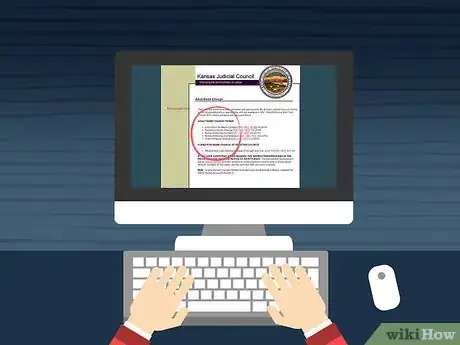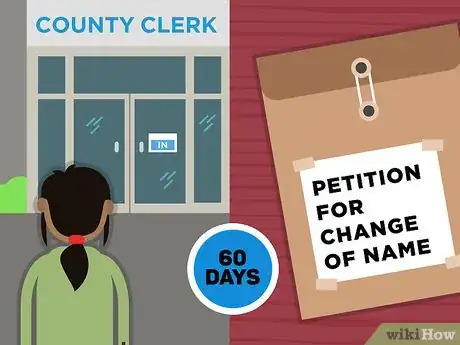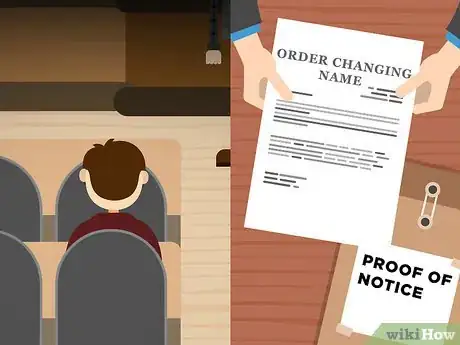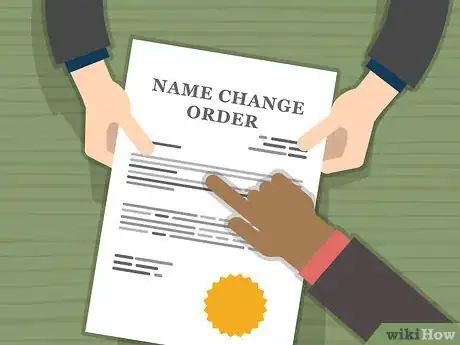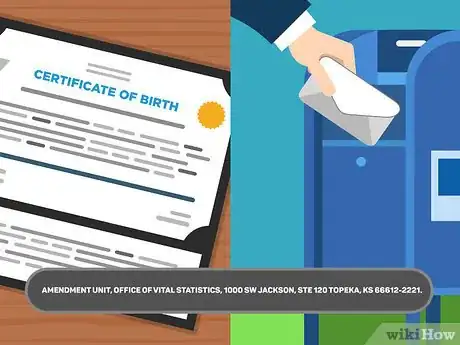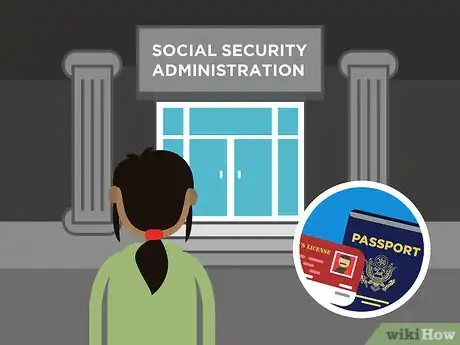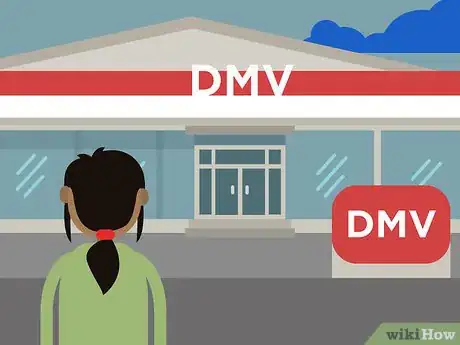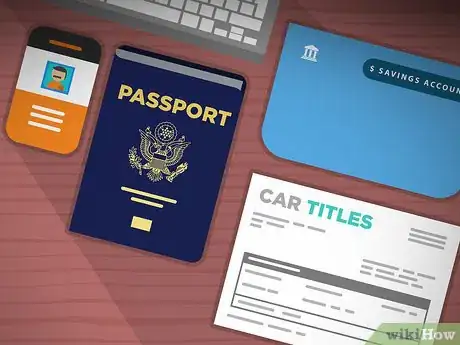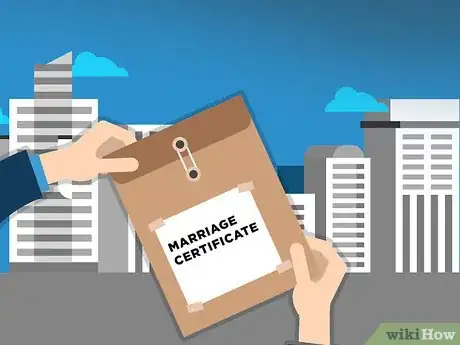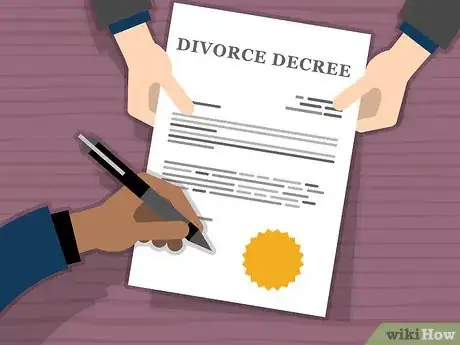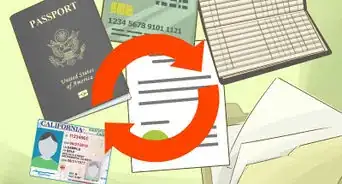This article was co-authored by Clinton M. Sandvick, JD, PhD. Clinton M. Sandvick worked as a civil litigator in California for over 7 years. He received his JD from the University of Wisconsin-Madison in 1998 and his PhD in American History from the University of Oregon in 2013.
There are 10 references cited in this article, which can be found at the bottom of the page.
This article has been viewed 57,228 times.
Kansas law allows an adult resident of Kansas to change their name after marriage, divorce, or for personal reasons. You can file to change your name through the District Court in the county in which you live. After following proper court procedures, you can obtain a court order that legally changes your name.
Steps
Completing Court Procedures to Change Your Name
-
1Choose your new name. Choose either a new: first, middle, or last name. Whether you choose an entirely new name or simply a new middle name, it will be the same process.[1]
-
2Complete the necessary court forms. The Kansas Judicial Council has approved standardized [name change forms for adults] that are suitable for use in any Kansas court. These forms include:
- Civil Cover Sheet – This document gives the court your contact information.
- Petition for Change of Name – This document formally requests your name change.
- Notice by Publication – The court may require you to publish notice of your name change in the newspaper. If so, you will use this form to do so.
- Notice by Mail – The court may require you only to mail notice of your name change to the appropriate parties. If so, you will use this form to do so.
- Order Changing Name – This is the document that the court signs in order to formally change your name.
Advertisement -
3File the Petition for Change of Name with the court. You should file the original and one copy of the signed and completed Petition with the Clerk of the District Court in the county in which you live. You also should file your Civil Cover Sheet with the Clerk.[2]
- You must be a resident of the state of Kansas for 60 days before you can file a petition for a name change.
- You must be an adult who is over 18 years of age in order to file a petition for a name change.
-
4Pay the court filing fee. The amount of this fee will vary by county. Contact your Clerk to find out the correct amount of the court filing fee. The fee usually ranges from $150.00 to $175.00.[3]
- If you are a low-income individual and cannot afford to pay the filing fee, you can file a request with the court to waive the filing fee.[4]
-
5Obtain the case number and division assignment from the Clerk. You will need this information in order to know the name of the court to which your case has been assigned. You also will need to contact your assigned court directly and ask what notice is required, as well as for a hearing date. In the state of Kansas, each District Court can determine which notice method must be used by individuals who want to change their names.[5]
-
6Publish notice of your name change in the newspaper if required. If your court requires notice by publication, you will need to publish notice of your name change in a newspaper in the county in which you live that is authorized to publish legal notices. Contact the legal advertisements department of the newspaper. You will have to pay a fee to publish your notice in the newspaper.[6]
- Your notice must be published for a total of three weeks, at least once per week.
- Upon completion, the newspaper will send either you or the court a statement of publication. If you receive the statement, bring it to your court hearing.
-
7Send notice of your name change by mail if required. You will need to send each notice by registered mail, return receipt requested. Bring the return receipt with your to your court hearing so that you have proof that you sent notice of your name change by mail.[7]
- Notice by mail should be sent to all interested parties, such as your creditors.
-
8Attend a court hearing. Bring your proof of notice, whether by mail or by publication, with you to your hearing. Also bring your completed Order Changing Name to the hearing. The judge will sign your order, which legally changes your name.[8]
Changing Your Name with Other Offices
-
1Keep your original name change order. This is the official certificate that legally certifies the changing of one's name. Use this document to change your name at any public or private institution.
-
2Amend your birth certificate, if you choose. You are not required to amend your birth certificate to show your new name. However, if you want to amend your birth certificate, mail a copy of your name change order to the Office of Vital Statistics, along with a request that your birth certificate be amended and the required $15.00 fee.
- Mail your request to: Amendment Unit, Office of Vital Statistics, 1000 SW Jackson, Ste 120 Topeka, KS 66612-2221.
- If you want a certified copy of your amended birth certificate, you will need to pay an additional $15.00 fee.
-
3Change your name with the Social Security Administration. Bring your name change order to your local Social Security Administration office. You also will need proof of your identity, such as a driver’s license or other identification card, and proof of your U.S. citizenship, such as your birth certificate or passport.[9]
-
4Change your name with the DMV. You will need to bring your name change order to the DMV in order to get your name changed on your driver’s license. The name change order must be the original order or a certified copy.
-
5Change your name with other offices as needed. You should give notice of your name change to your bank, your creditors, the IRS, and your employer. You also should change your name with any offices with which you hold accounts, such as your cell phone provider, electric company, and gas company.
Changing Your Name After Marriage or Divorce
-
1Take your official marriage certificate to the pertinent agencies. After you are legally married, you may take your marriage certificate to the DMV, Social Security Administration, bank, etc. to legally change your name. There is no need to file a name change petition, although you may be required to fill out separate change of name forms at each agency.
-
2Use the simplified name change service offered on the [Kansas state government website.] This easy service provides the relevant forms for submitting your name change to nearly all pertinent agencies, including the DMV, IRS, SSA, credit card companies, and more. To use this service, you must pay a one-time fee of $30.
-
3Include your name change in your divorce decree. When you get divorced, make sure your attorney has the name change request written into the divorce decree that the judge will sign. Next, take your divorce decree to all relevant state and private agencies like the DMV, Social Security Administration, your bank, etc., to legally change your name at each agency.
-
4Request the court to restore your maiden name or previously married name. This option is available if your divorce decree did not have your name change written into it. This is a simplified procedure because people who have recently gotten divorced.[10]
Warnings
- K.S.A. 60-1402, the Kansas statute that governs name changes, makes no reference to an individual’s ability to change a minor child’s name.⧼thumbs_response⧽
References
- ↑ http://kslegislature.org/li_2012/b2011_12/statute/060_000_0000_chapter/060_014_0000_article/060_014_0002_section/060_014_0002_k/
- ↑ https://www.kansasjudicialcouncil.org/sites/default/files/Petition%20for%20Name%20Change%20%2812-2010%29.pdf
- ↑ https://www.kansasjudicialcouncil.org/sites/default/files/Instructions%20for%20Name%20Change%20%284-2014%29.pdf
- ↑ https://lawhelpinteractive.org/Interview/GenerateInterview/2112/engine
- ↑ https://www.kansasjudicialcouncil.org/sites/default/files/Instructions%20for%20Name%20Change%20%284-2014%29.pdf
- ↑ https://www.kansasjudicialcouncil.org/sites/default/files/Notice%20of%20Hearing%20by%20Publication%20%2812-2010%29.pdf
- ↑ https://www.kansasjudicialcouncil.org/sites/default/files/Notice%20of%20Hearing%20by%20Mail%20%2812-2010%29.pdf
- ↑ https://www.kansasjudicialcouncil.org/sites/default/files/Order%20for%20Name%20Change%20%2812-2010%29.pdf
- ↑ http://www.ssa.gov/pubs/EN-05-10513.pdf

